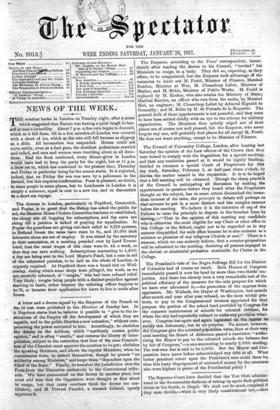A letter and a decree signed by the Emperor of
the French on the 19 inst. were published in the Moniteur of Sunday last. In it Napoleon states that he believes it possible to " give to the in- stitutions of the Empire all the development of which they are capable, and to the public liberties a new extension," without com- promising the power entrusted to him. Accordingly, he abolishes the debate on the Address, which "needlessly excites public opinion," and is often " sterile," and restores the liberty of inter- pellation, subject to the restriction that four of the nine Commit- tees of the Chamber must approve the question to be put; abolishes the speaking Ministers, and allows the regular Ministers, when he .commissions them, to defend themselves, though he grants " no solidarity among Ministers," and keeps them "dependent upon the Chief of the State." Finally, he transfers the jurisdiction over the Press from the Executive exclusively to the Correctional tribu- nals. We have commented on this decree in another place, but must add here that the Opposition were thought at first about to resign, but that many courtiers think the decree too con- ciliatory, and M. Prevost Paradol, a staunch Liberal, openly approves it.






























